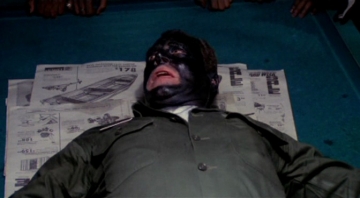

Knowing the controversy a film like "New Jack City" caused, I'm sure that this movie would provoke far worse situations when re-released properly. But, perhaps the most fascinating aspect about "The Spook who sat by the Door" is the psychological battle inside the protagonist's head, resulting in a dazzling end-scene. Around the hour, more action kicks in and we're treated to several convincing riot-sequences and atmospheric images of the ghetto under siege. True, the film contains a little too much talking and some of the sentimental speeches are hard to swallow (like Freeman's supposedly heart-breaking tale of how he taught his grandmother to read), but most of the criticism against America are quite thought-provoking, daring and way ahead of their time. The message and criticism in the screenplay is so well-elaborated because Sam Greenlee adapted it from his own novel. After an intense training and a mind-strong career of 5 years, Freeman returns to the ghetto where he grew up and mobilizes the future-less black youth to stand up for themselves and begin a violent revolution against the white authorities. Cook plays Dan Freeman, the first CIA-recruit since the start of the agency. Very intelligent and sublimely scripted film that stars Larry Cook in a truly powerful role. Taking budget issues into consideration and what director Ivan Dixon had to do to get the film made, it is well worth watching (even again). Included is some of the socio-political issues that made the 60s and 70s what it was, making this film one that stands out in a decade of films high on action and low on plot.
THE SPOOK WHO SAT BY THE DOOR HOW TO
Without spoiling the rest of the film there is the classic struggle about how to approach change through the system or to over throw? This is represented by Freeman and a former friend who is now police chief in Chicago. After a few years of service with the CIA he returns home to Chicago and in his capacity as a social worker he organizes local gangs using his knowledge and training from the CIA. Though he plays his role, one gets the impression he is planning something big. Freeman finds himself the token black, he is often called to show visitors what progress the CIA is making in race relations, before continuing his menial tasks of copying papers and giving tours. The CIA agrees, although those in charge of the training do all that is possible to kick all of the recruits out. To win favor he decided to charge the CIA with racism since they have no black agents. The film begins with a senator facing the prospect of losing an election without the pivotal black vote. This film holds this title with good reason. The Spook Who Sat by the Door is a cult classic and named one of the most influential black films of the 70s (by Torriano Berry and Venise Berry in their book The 50 most influential black films). A ground-breaking film! (Does anyone but me catch the irony of the main character's name? "Free Man"?) Made in 1973, it still packs a punch, and is worth tracking down and buying (Do a web-search! That's how I got my copy!). A white man (like myself) may find the diatribes against "whitey" shocking, but this film was made during a time of great racial strife, and it echos those times. But "Spook", shot on a small budget, has a powerful message: Never underestimate anyone! Not even "the spook who sat by the door"! As a motion picture, it does have technical weaknesses, but the drama is well-played, the plot is very tight and the characters are believable. The film was quickly followed by a long line of "blaxploitation" films, often made with little regard for content and style. The film is a faithful adaptation of Sam Greenlee's controversial novel of the same title, and a haunting look at what MIGHT have (and maybe damned near) happened in the USA during that turbulent period of history. He also details how racial stereotypes can be used to one's advantage, citing how no one ever notices a smiling black man in an office carrying a mop. Freeman explains how to establish a hierarchy in an underground movement, how to recruit new members, living on the street, and forming new cells. Secretly, he is training a street gang into a guerrilla army to be the vanguard in a race war, using all of his training by "the man" against "the man". Incensed by his mistreatment (and the racial stereotyping of his superiors), he resigns to his native Chicago as a social services worker. As the title suggests, he's placed by the door of the office so he's the first person everyone sees. Trained in all sorts of espionage, he is relegated to working in the copying department as a "showcase" employee of integration.

Dan Freeman (played by Lawrence Cook) is a token black CIA operative.


 0 kommentar(er)
0 kommentar(er)
